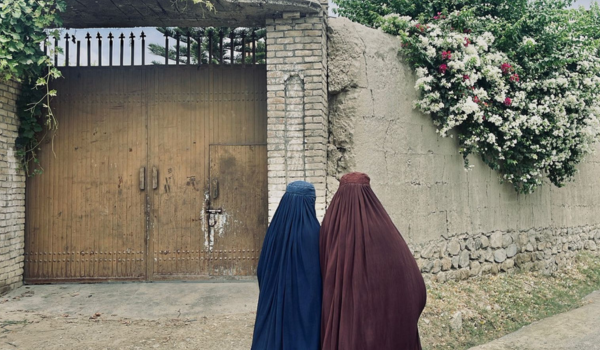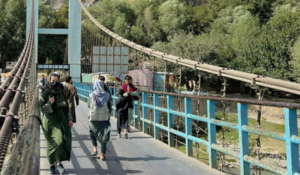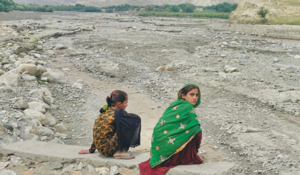(14 September 2024) Since the Taliban assumed power in 2021, Afghan women and girls have faced increasingly severe restrictions on their rights and freedoms, with over 100 edicts limiting their mobility, public assembly, access to healthcare, education, employment, sports, and recreational activities. UN Secretary-General António Guterres has warned of the gender-based apartheid unfolding in Afghanistan. In September 2023, UN Women Executive Director Sima Bahous called for an "intergovernmental process to codify gender apartheid in international law explicitly."
However, there also good news to share. Recently, on 7 September 2024 the majority in the UN Security Council condemned the so-called virtue law, as it exacerbates "already unacceptable restrictions on human rights". Twelve out of 15 UN Security Council — Japan, Ecuador, France, Great Britain, Guyana, Malta, Mozambique, South Korea, Sierra Leone, Slovenia, Switzerland and the USA — signed the declaration, whereas China, Russia and Algeria unsurprisingly did not.
The End Gender Apartheid Campaign
In October 2023, over 100 prominent jurists, public figures, academics, and civil society leaders urged the international community to include the crime of gender apartheid in the Draft Crimes Against Humanity Convention currently under consideration by the UN General Assembly. Additionally, last March, dozens of prominent Afghan and Iranian figures, such as Horia Mosadiq, Director of Conflict Analysis Network (CAN), and global human rights defenders, including Karima Bennoune, Law Professor and Former UN Special Rapporteur in the Field of Cultural Rights, launched the grassroots End Gender Apartheid Campaign.
Race-based and gender-based apartheid occur within regimes of institutionalized and systemic oppression. This was highlighted by Karima Bennoune, Professor of Law at the University of Michigan, during a July 2024 conference on the codification of gender apartheid as a crime against humanity at the Middle East Institute in Washington, DC.
Apartheid differs from other international crimes in two key ways: it occurs only within an institutionalized regime of systematic oppression and domination, and it is committed with the specific intent of maintaining that regime. This intent can persist beyond the individuals who initially established it. In Afghanistan, the prevailing regime has constructed a governance system characterized by laws and policies that enforce the segregation of women and men, excluding women from public spaces and spheres. This system is effectively dehumanizing women and girls in comparison to men. Such a regime goes beyond the inequalities most societies still strive to eliminate.
As the prevailing regime in Afghanistan increasingly resembles a system of apartheid, numerous individual and collective initiatives have emerged to address this issue. Several social media campaigns led by Afghan women, such as #UnitedAgainstGenderApartheid, have raised awareness about gender apartheid, including the End Gender Apartheid Campaign. Many Afghan advocates, both women and men, have received training in effective advocacy. Many conferences and gatherings of Taliban opposition groups, such as the Herat Security Dialogue, now prioritize addressing gender apartheid on their agendas. At the same time, studies and research continue to contribute to the movement's growing momentum.

The importance of the codification of gender apartheid as a crime against humanity
Afghan women and international human rights defenders advocate for recognizing gender apartheid as a crime against humanity due to its systematic and entrenched nature. Apartheid involves deliberately creating and maintaining a regime that oppresses and dominates a specific group for the benefit of the dominant group. As Akila Radhakrishnan, Strategic Legal Advisor for Gender at the Atlantic Council, notes, this oppressive system is self-perpetuating, controlling every aspect of the marginalized group's life and making escape nearly impossible. The regime justifies its existence through a belief in the dominant group's superiority, institutionalizing the subjugation within the apartheid system.
Radhakrishnan further emphasizes that the intent behind apartheid goes beyond mere discrimination; it is about maintaining a governance system based on systematic domination. This is what distinguishes gender apartheid from other forms of persecution under international law — the focus is on preserving the oppressive system itself rather than simply depriving individuals of rights based on their identity. This distinction is why gender apartheid is seen as separate from other forms of gender persecution.
The Taliban's inhumane actions — including arbitrary arrests, imprisonment, and torture — occur within a regime explicitly designed to oppress and dominate women to consolidate and maintain power systematically. Consequently, Afghan women, supported by international human rights organizations, gender and legal experts, and activists, are demanding that these actions be recognized and labeled as gender apartheid.
Codifying gender apartheid as a crime against humanity would create pathways for holding the Taliban accountable as perpetrators. This legal recognition would also bolster international solidarity by highlighting the severity of the situation in Afghanistan and using the associated stigma to criminalize the Taliban's actions. Recognizing gender apartheid as a crime allows the international community to develop a coordinated and complementary response, utilizing a variety of international and domestic legal tools in Afghanistan to address the ongoing suffering of women and girls in Afghanistan comprehensively and effectively. For Afghan women – both inside and outside the country — and international human rights defenders, the codification of gender apartheid as a crime against humanity is an essential shared goal.
The Role of INGOs and Global Advocacy Groups in Supporting the End Gender Apartheid Campaign
Several international organizations, including the Atlantic Council and the Global Justice Center, are actively working to codify gender apartheid as a crime under international law, mainly focusing on Afghanistan. Their efforts involve creating legal briefings, developing advocacy strategies, and endorsing joint letters to states to push for this codification. They propose modeling the definition of gender apartheid on the crime of racial apartheid, highlighting the Taliban's oppression of women, girls, and LGBTQIA+ individuals. The collaborative effort must continue, focusing on equipping Afghan advocates, especially women, with the knowledge and legal tools needed to lead these advocacy efforts, including through training in international law.
INGOs can also assist Afghan advocates by facilitating their engagement with the UN's legal office to adopt gender apartheid terminology and by arranging meetings with South African advocates to leverage experiences from the racial apartheid movement. The need for effective international action to recognize gender apartheid in Afghanistan, akin to the UN's response to racial apartheid in South Africa, is critical. Codifying gender apartheid within the Crimes Against Humanity Convention and utilizing soft law declarations should be highlighted as potential tools for mobilizing action and holding perpetrators accountable. These are specific skills and tools that Afghan advocates and lawyers need to be empowered with.
UN experts have urged the inclusion of gender apartheid as a crime against humanity under Article 2 of the draft articles on the prevention and punishment of crimes against humanity, currently under review by the UN General Assembly's Sixth Committee. In response, the UN Women's Executive Director proposed a multilateral process to codify gender apartheid under international law. The UN must seize the draft Crimes Against Humanity treaty — the first major global treaty on core international crimes since the 1998 Rome Statute of the International Criminal Court—as a unique opportunity to enshrine gender apartheid as a crime under international criminal law.
Several Afghan-led and international NGOs, such as Rawadari, Amnesty International, and the UN, are documenting human rights violations to establish an international accountability mechanism. These efforts require sustained political and financial support. International NGOs must ensure that this documentation continues smoothly due to insufficient resources.



